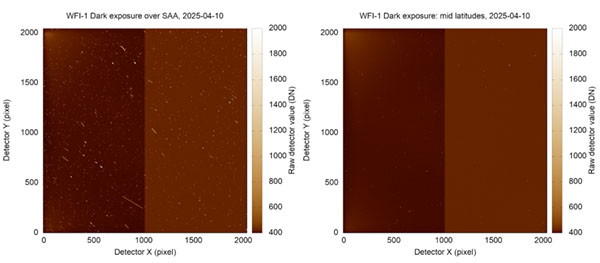PUNCH images the door: even dark frames are useful
This is a PUNCH Science Nugget

Two dark frames collected from WFI-1 on 2025-04-10 show a few important effects in the darkest 3% of the dynamic range: low detector read noise, dual-readout digitizer offsets, very faint glint coming from the instrument door, and radiation over the South Atlantic Anomaly.
During the week of 2025 April 7, PUNCH collected calibration data from the instruments – our last chance to take advantage of closed doors, before they open. Even these “dark frames”, taken with the doors closed, are interesting to look at. These images are “Level 0” (unprocessed) data products generated by the Science Operations Center (SOC), with full flight metadata attached. The cameras are working properly, with low noise levels. The images are brighter on the right because PUNCH uses dual readout detectors, with separate digitizers for the two halves of the images; they have slightly different zero points, an effect we remove at “Level 1” and higher. There is a very small amount of light visible in the upper left, which we believe is stray light scattered by the closed instrument door itself. Over the South Atlantic Anomaly in Earth’s magnetic field, an area of enhanced cosmic ray flux, we see significant particle impacts on the detector. The rate of impacts agrees with calculations performed over six years ago, during the mission’s Phase A concept study.
PUNCH science nuggets are archived on our News Page.



